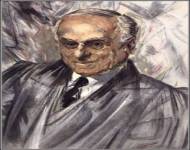Early Life
Felix Frankfurter was born in Vienna, Austria on November 15, 1882. He lived in Vienna until the age of 12, when he and his family immigrated to the United States. He grew up in New York City, where he attended public schools. Frankfurter was Jewish, and many of his family members were rabbis.
When Frankfurter graduated high school, he attended the College of the City of New York, where he graduated in 1902. He then attended Harvard Law School, where he graduated from in 1906 as first in his class.
Career
After graduating, Frankfurter worked at the office for the U.S. Attorney for the Southern District, Henry L. Stimson. Later on in his career, Stimson helped Frankfurter to get a position at the Bureau of Insular Affairs in the Department of War under President Taft’s administration.
In 1914, Frankfurter went back to Harvard as a faculty member where he taught courses on Constitutional and Administrative Law. When World War I broke out, Frankfurter worked as an assistant to the Secretary of War, Newton Baker. He also oversaw labor disputes as the Chairman of the War Labor Policies Board. In 1919, Frankfurter went to the Versailles Peace Conference to provide support for the creation of a Jewish state.
While teaching at Harvard, Frankfurter helped to found the American Civil Liberties Union. In 1920, Frankfurter spoke out in support of the innocence of Sacco and Vanzetti, two men who many believe were wrongly found guilty of first degree murder in Massachusetts. After their conviction and death sentence, Frankfurter argued for their innocence in a published article. Unfortunately, this was done to no avail.
Justice Oliver Wendell Holmes Jr. and Louis Brandeis were close friends of Felix Frankfurter during his career. Frankfurter often recommended students he taught at Harvard to the Justices for employment as clerks.
Supreme Court
Frankfurter is the only naturalized American to have served on the Supreme Court. Although some concern was raised by President Roosevelt’s critics because of Frankfurter’s religious beliefs, Frankfurter’s appointment was well-received by many. Frankfurter was only the third Jewish Supreme Court justice, with Justice Cardozo and Justice Brandeis preceding him on the Court.
Frankfurter was known for following a policy of judicial restraint. In 1940, he wrote the majority opinion in Minersville School District v. Gobitis. The case was brought by the father of students who were expelled for refusing to salute the American flag. The children were Jehovah’s witnesses and it was against their religion to participate in the ceremony to salute the flag. The majority ruled that school districts could be allowed to compel their students to salute the flag. In that decision, Frankfurter wrote “The mere possession of religious convictions which contradict the relevant concerns of a political society does not relieve the citizen from the discharge of political responsibilities.” Minersville School Dist. v. Gobitis, 310 U.S. 586, 594-595 (1940).
In Korematsu v. United States, Frankfurter concurred with the majority. In that case, the Court ruled that the internment of Japanese people during World War II was constitutional. Frankfurter wrote that he felt there was nothing in the Constitution which stopped the government from exercising powers during war to safeguard national security, even if it meant the internment of American citizens.
For the 1948 term, Frankfurter hired William Thaddeus Coleman as his law clerk. Coleman was the first African American law clerk for the Supreme Court.
Fourteen years after the Minersville and Korematsu decisions, Frankfurter voted with the majority in Brown v. Board of Education, finding that school segregation was illegal.
Later Years
After suffering from a stroke in 1962, Frankfurter resigned from the Supreme Court. In 1963, he was awarded the Presidential Medal of Freedom by President Lyndon B. Johnson. On February 22, 1965, Frankfurter died in Washington, D.C. after suffering a heart attack. He was 82.








